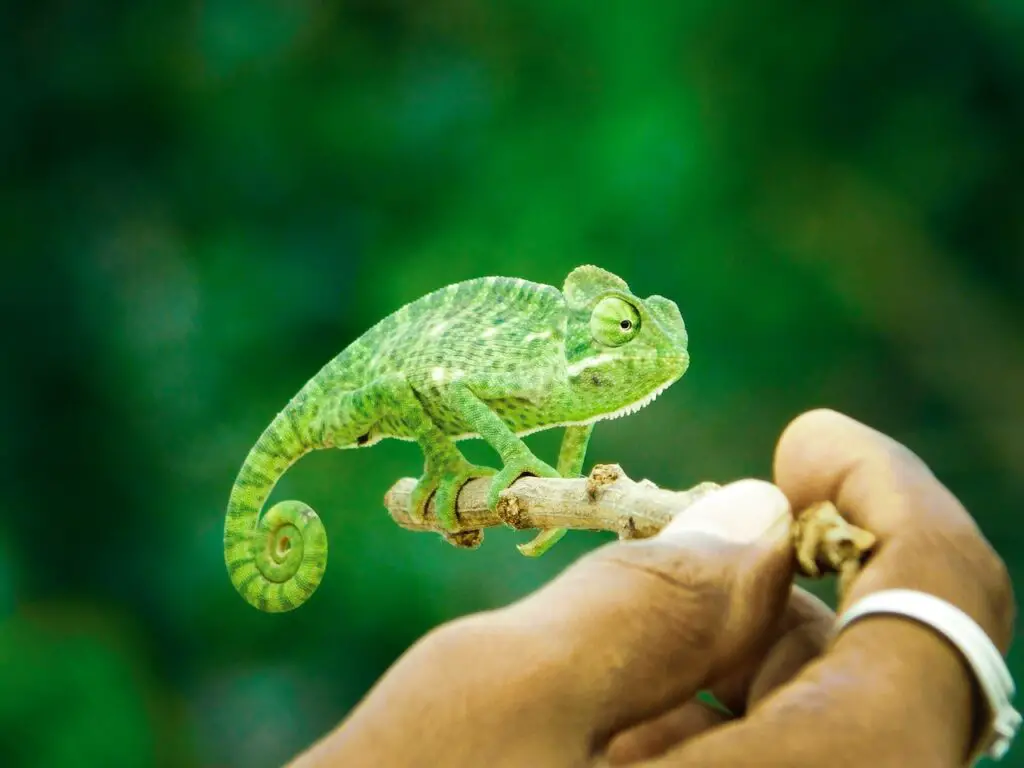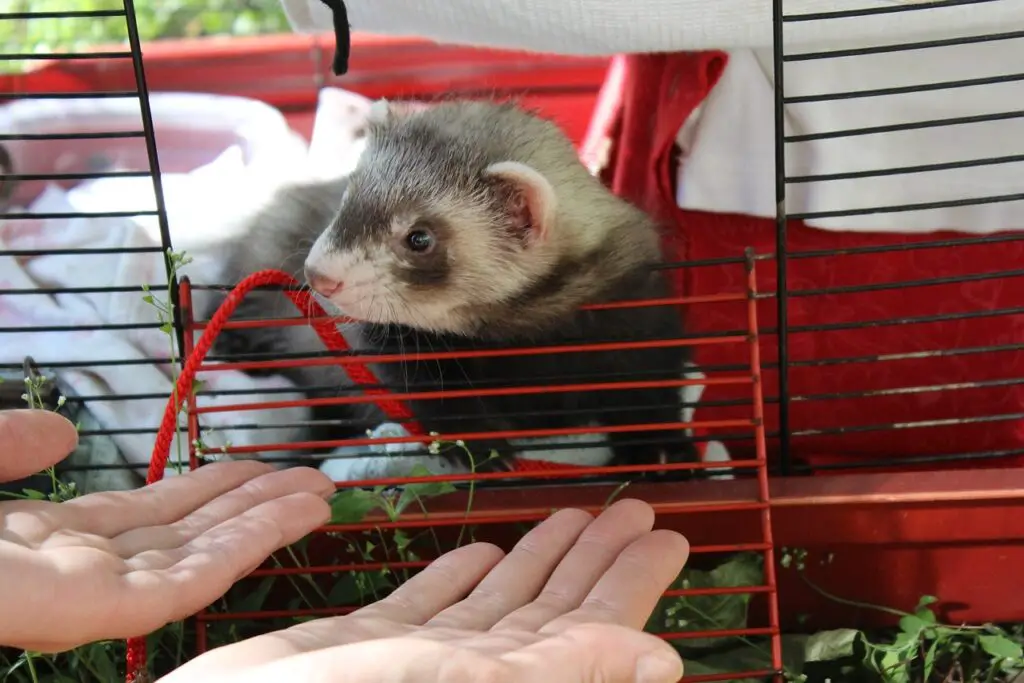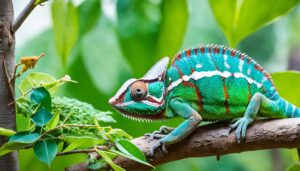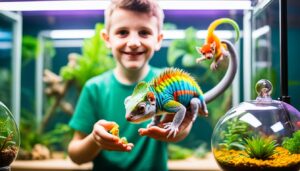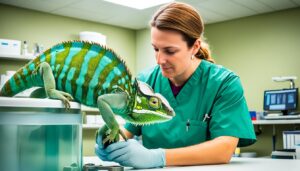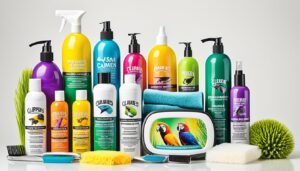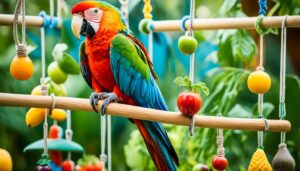Your Ultimate Resource for Anything Related to Exotic Pets
Our goal is to provide factual, helpful and practical information about exotic pets.
Browse Our Content By

Who We Are
Peter Stones is the founder of Exotic Pets Place, the leading online resource for exotic pet care information.
With over 10 years of hands-on exotic pet ownership experience, he is deeply passionate about sharing his expertise to help others properly care for their unusual pets.
When he’s not writing extensively researched articles or connecting with fellow exotic pet enthusiasts worldwide, you can find Peter at home tending to his own beloved menagerie of exotic animals.

Peter Stones
Peter Stones is the founder and lead author of Exotic Pets Place, the most trusted online resource for exotic pet care advice. With over 20 years of extensive hands-on experience caring for a diverse collection of exotic animals, Peter is an established authority on the specialized needs of these unique pets.
After discovering his lifelong passion for misunderstood, exotic creatures in childhood, Peter has spent decades actively involved in the exotic pet community. He has owned dozens of different exotic pets throughout his life, from tarantulas to snakes and everything in between. Through firsthand experience and collaborations with exotic animal professionals worldwide, Peter has developed expert-level knowledge on proper exotic pet nutrition, housing, behavior, training, and healthcare.
Peter created Exotic Pets Place to empower fellow exotic pet lovers with the practical, research-backed guidance they need to keep their pets happy and healthy. He oversees a team of experienced exotic pet owners and licensed professionals who provide accurate, up-to-date information based on the latest exotic animal research and best practices.
When he's not writing comprehensive care articles or connecting with the global exotic pet community, you can find Peter at home tending to his personal exotic pet collection. His lifelong passion is sharing his wealth of exotic pet expertise to support others on their journey of responsible exotic pet ownership.
Check Our Latest Posts
- Exotic Pet Potty Training Tips & Tricksby Peter StonesOver 10% of American homes now have exotic pets. Today, potty training them is key to their care. While it’s hard, the right methods can be rewarding for both pet and owner. Keeping your place clean is just one goal. Potty training helps your pet and you live happily together. It includes understanding your pet and using the best training methods. Whether it’s a ferret or a parrot, knowing how to train...
- Expert Tips on Exotic Animal Behavior Modificationby Peter StonesDid you know that recent studies show about 80% of exotic pet owners deal with major behavior issues in their pets? This high percentage points to the urgent need for good strategies in modifying exotic animal behaviors. It’s critical to understand and deal with the complexities of exotic animal behaviors. Over the last two decades, experts like Dr. Susan G. Friedman, PhD, and skilled vets have led the way in improving behavior...
- Train Your Exotic Pet: Expert Trick Tipsby Peter StonesDid you know that over 60% of exotic pet owners say their pets behave better and bond deeper with them through trick training? If you’re wondering how to show off your unique buddy, you’ve found the right spot. Learning exotic pet trick training starts with getting to know your pet’s behavior. Use kind and patient ways. These tips are great for teaching your parrot to wave or getting your bearded dragon to...
- Exotic Mammal Obedience Training Tips & Tricksby Peter StonesDid you know over 5% of American homes have exotic pets like guinea pigs and hamsters? These special pets bring joy but are hard to train. They act differently than regular pets and need special training to learn. Training exotic animals is important for their well-being. Not only are they smart and loving, but training them can make them great pets. We’ll share tips to make training easier and fun for both...
- Primate Training Techniques | Effective Methodsby Peter StonesUsing positive reinforcement in primate training can cut vet procedure times down by 50%. This approach makes caring for primates easier and less stressful. It does this by getting primates to join in their care. Primate animal behavior training focuses on rewards, not force. This boosts the wellbeing of captured primates by promoting working together happily. Rather than forcing them, training them to do tasks on their own smoother. This includes exams,...
- Reptile Training for Beginners: Tips & Tricksby Peter StonesDid you know reptiles can remember you, just like dogs and cats do? This amazing fact shows they can form deep bonds. If you’re starting to train your reptile, this guide has helpful tips and techniques. Reptiles need a different approach compared to other pets. This guide is for new owners who want to train their reptile right. The key is being patient and consistent to build a strong connection with your...
- Exotic Bird Training Tips for a Harmonious Homeby Peter StonesDid you know well-trained birds are 70% less likely to have problems? By picking up and using some top-notch bird-training tips, you can make friends with your feathered pal. Your daily chats with the bird are key to how it behaves. Just like how meeting Person A or Person B affects our mood, showing love to your bird can totally change its attitude and how well it listens to you. Key to...
- Exotic Pet Habitat Ideas & Design Tipsby Peter StonesDo you know a well-made home can greatly help your exotic pets’ health and happiness? The perfect space for them is more than good-looking. It needs the right size, materials, and natural parts. Using the best design ideas will make a place that’s enjoyable and healthy for your special pets. Key Takeaways: Designing a suitable habitat is crucial for the well-being of exotic pets. Consider factors such as enclosure size, substrate type,...
- Exotic Pet Diet and Feeding Tips for Healthy Petsby Peter StonesDid you know that many health problems in exotic pets come from bad food? Things like not enough calcium or missing vitamins can hurt them. So, it’s very important to feed them right. Different types of exotic pets, like birds or reptiles, need different foods. If they don’t get the right kind of food, they can get sick. For example, they might have trouble with their teeth, get too fat, or have...
- Exotic Pet Care Guides for Unique Speciesby Peter StonesDid you know that wrong care often makes exotic pets sick or even die? It’s key to know what each special animal needs to stay healthy. Each unique pet, from little mammals to reptiles, amphibians, and birds, has its own set of care rules. These rules are different from those for common pets like cats and dogs. Key Takeaways: Proper care is essential for the health and well-being of exotic pets. Exotic...
- Exotic Pet Owner Educational Resources Guideby Peter StonesDid you know over 7 million households in the U.S. have exotic pets? For those who own or think of owning a unique pet, finding good info is vital. No matter your experience level, it’s important to have access to trusted advice. Luckily, many resources exist to guide you in caring for these special animals. Key Takeaways: Education is key to responsible exotic pet ownership There are over 7 million households in...
- Essential Exotic Pet Safety and Security Gearby Peter StonesDid you know there are over 7 million exotic pets in the United States? Their owners work hard to keep them safe. This often means having the right tools, whether for preventing natural disasters or other dangers. This article looks at the best safety and security gear for exotic pets. We’ll talk about everything from special enclosures to emergency bags and ID tags. This information will help you keep your exotic pet...
- Exotic Pet Breeding Supplies & Equipment Essentialsby Peter StonesDid you know the right supplies and equipment are key for breeding exotic pets? It’s vital for watching breeding behaviors, creating perfect breeding conditions, and the overall care of these pets. There are many tools for exotic pet breeders, like petri dishes and incubation boxes. These are crucial for breeding success and the well-being of the animals and their young. Key Takeaways: Having the right supplies and equipment is essential for breeding...
- Exotic Pet Training & Behavior Aids Tipsby Peter StonesDid you know exotic pets need special attention, especially in training and behavior? They are not like our usual pets. They have different ways and needs that are unique to them. This guide will show you how to train and handle the behavior of exotic pets. Whether you own a reptile, bird, small mammal, or any unique pet, these tips will make things easier. You’ll learn how to understand your pet’s behavior,...
- Exotic Pet Veterinary Care Essentials Guideby Peter StonesInadequate care is a big reason for illness and death in exotic pets. It’s crucial to understand what each kind of exotic animal needs for their health and happiness. Whether it’s a reptile, bird, rodent, or amphibian, the right care is key. For the best care of your exotic friend, working with a vet who knows exotic pets is the first step. Key Takeaways: Proper care is essential for the health and...
- Exotic Pet Cleaning and Maintenance Products Guideby Peter StonesKeeping exotic pets healthy needs special cleaning products. Reptiles, amphibians, and tropical pets have different hygiene needs. So, regular pet cleaning stuff won’t work. This is why owning exotic pet cleaning and maintenance products is key. They’re made just for these special friends. Key Takeaways: Exotic pets need special cleaning and maintenance items for their health. Regular pet cleaning things won’t be right for reptiles, amphibians, and tropical pets. Using top-notch exotic...
- Essential Exotic Pet Travel and Transport Supplies Guideby Peter StonesOver 20 million households in the U.S. have exotic pets. These pets range from reptiles to small mammals and birds. When it’s time to move, they need extra care for safety and comfort. This guide offers tips for traveling with exotic pets. You’ll learn about carriers and special products. These items will help your pet feel safe and content on the go. Key Takeaways: Traveling with exotic pets requires careful planning and...
- Exotic Pet Heating & Lighting Equipment Guideby Peter StonesDid you know that proper heating and lighting are crucial for the well-being of exotic pets? Creating a cozy terrarium for your exotic pet needs thought on heating and lighting. This guide will show you the importance of heating and lighting for your pet’s happiness. You’ll learn about lighting, picking the best lights, and the bulbs you can use. This includes both for light and heat. Key Takeaways: Proper heating and lighting...
- Exotic Pet Bedding and Substrate Options Guideby Peter StonesFinding the best bedding and substrate for your unique pets is crucial. Each type of animal has different needs, such as the need to burrow or for high humidity. In this guide, we’ll look at many options to meet your rare pets’ needs. You’ll find top-notch bedding and friendly substrates here. Key Takeaways: Choosing the right bedding and substrate is essential for the health and well-being of your exotic pets. Different animals...
- Exotic Pet Enrichment and Toys Guideby Peter StonesEnrichment is key for the well-being of exotic pets. This includes birds, rodents, rabbits, and raccoons. They need both physical and mental activities to be happy in captivity. Without these, they might get bored, anxious, or start destructive habits. For exotic pets, there are many toys and activities available. These engage their senses and encourage natural behaviors. It’s vital to keep these pets’ minds and bodies active, whether they’re furry or feathered....
- Exotic Pet Grooming Supplies | Best Care Essentialsby Peter StonesDid you know that exotic pets need special grooming supplies? They need these to stay healthy and happy. From unique tools to luxury items, the best supplies are crucial. Key Takeaways: Exotic pets require specialized grooming supplies to meet their unique needs. Investing in top-rated grooming products ensures the best care for your unique animal companions. Using the right grooming tools and supplies helps keep exotic pets happy and healthy. Regular grooming...
- Exotic Pet Health and Wellness Products Guideby Peter StonesInadequate care is the top reason exotic pets get sick or die. These special animals need more focused care to stay healthy. It’s important to use the right pet care and health items to keep them well. Key Takeaways: Exotic pets need special care to be well. The main cause of exotic pets getting sick or dying is not enough care. There are many health and wellness items made just for these...
- Comparative Nutrition for Exotic Pets Needsby Peter StonesThe study of nutrition for zoo and exotic animals is always changing. It aims to better see what these pets need in their diet. This field looks at their eating habits in the wild, mixes in research, and studies what foods will be best. The goal is to make specialized diets for each type of exotic animal. Comparing what we know about diets for pets like cats or dogs can help start...
- Conquer Picky Eating Habits in Exotic Pets Effectivelyby Peter StonesDid you know that dealing with picky eaters among exotic pets is vital? These pets have unique food needs and tastes. Sometimes this can be tricky during mealtime. It’s important to get why they are picky and then tackle the issue. This ensures they stay healthy and happy. Key Takeaways: Addressing picky eating habits is essential for the health of exotic pets. Understanding the dietary needs and preferences of each exotic pet...
- Nutritional Requirements for Aquatic Exotic Petsby Peter StonesDo you know that good nutrition is key for the health of aquatic exotic pets? Whether it’s a beautiful fish tank or a cool terrarium with unique reptiles, the right food is vital. It helps them grow, stay strong, and live longer. Key Takeaways: It’s crucial to know what food your underwater friends need for good health. Each type of aquatic pet has different food needs. They depend on their natural diet,...
- Exotic Pet Enrichment: Foraging & Feeding Tipsby Peter StonesHave you ever thought about how exotic pets need more than just basic care? They need mental activities to be truly happy. By giving them tasks that make them work for their food, we can make their lives better. Let’s look at some cool ways to do this in our next article. We’ll dive into how foraging and feeding can help exotic pets feel at home. Key Takeaways: Behavioral enrichment is essential...
- Exotic Pet Nutrition for Chronic & Metabolic Issuesby Peter StonesDid you know the right food is key for exotic pets with long-term health issues? These special critters need diets that fit their unique needs. This keeps them healthy and happy. Exotic pets like snakes, parrots, and hamsters need specific foods. Some eat only plants, like rabbits; others, like sugar gliders, eat both plants and meat. It’s important to give them food that’s like what they eat in nature. In this piece,...
FAQs
Exotic pets include any uncommon, non-domesticated animals like reptiles, amphibians, birds, insects, small mammals, and fish. They require specialized care compared to traditional pets like dogs and cats.
Laws regarding exotic pet ownership vary greatly by state and local jurisdiction. Some ban private ownership completely while others require permits or licenses. Always research the legality before obtaining an exotic pet.
Proper housing is essential and should closely mimic the natural environment. Consider space, temperature, humidity, lighting, substrate, and enrichment items specific to the species.
Dietary needs of exotic pets are often complex. Feeding an improper diet is a common cause of health issues. Work with an exotic vet to formulate a species-appropriate feeding plan.
Exotic pets should have annual exams to monitor health and detect issues early. Immediately contact an exotic vet if your pet displays any abnormal symptoms or behavior.
Some exotic species may not be ideal pets for small children as they require specialized care. Supervision is always recommended when children interact with any exotic pet.
Look for changes in appetite, energy level, posture, appearance, or behavior. Reptiles and birds often hide illness until advanced stages. Monitor closely for subtle changes.
Search for vets experienced in your particular exotic species. Confirm they have proper training and equipment to handle small exotic pets before your first visit.
Reputable online forums, clubs/societies, books, and expos offer useful exotic pet care information. Connecting with experienced owners is also very valuable.
Research all husbandry requirements and associated costs. Exotic pets are a long-term commitment requiring specialized care. Make sure you can provide a healthy lifelong home.

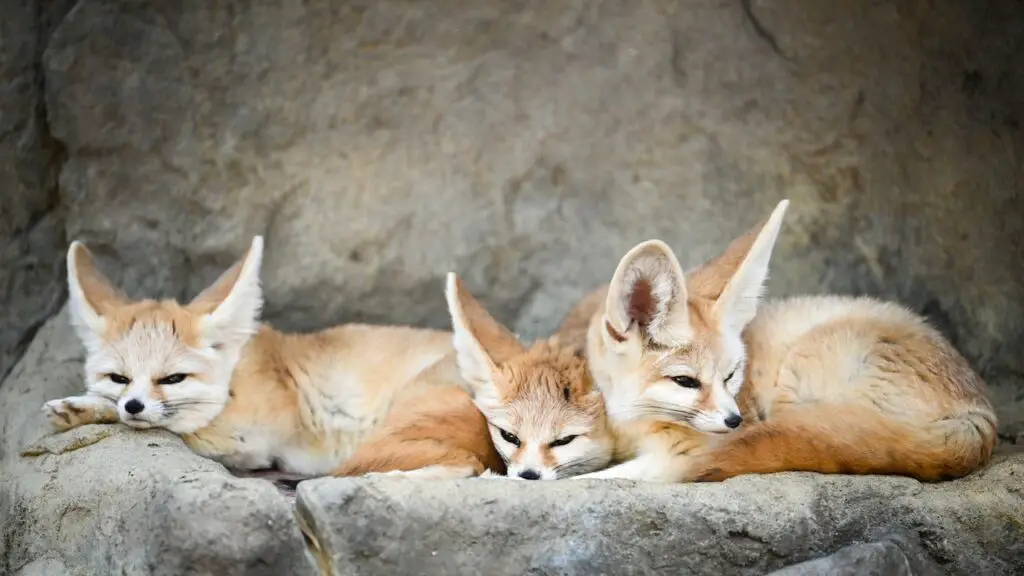
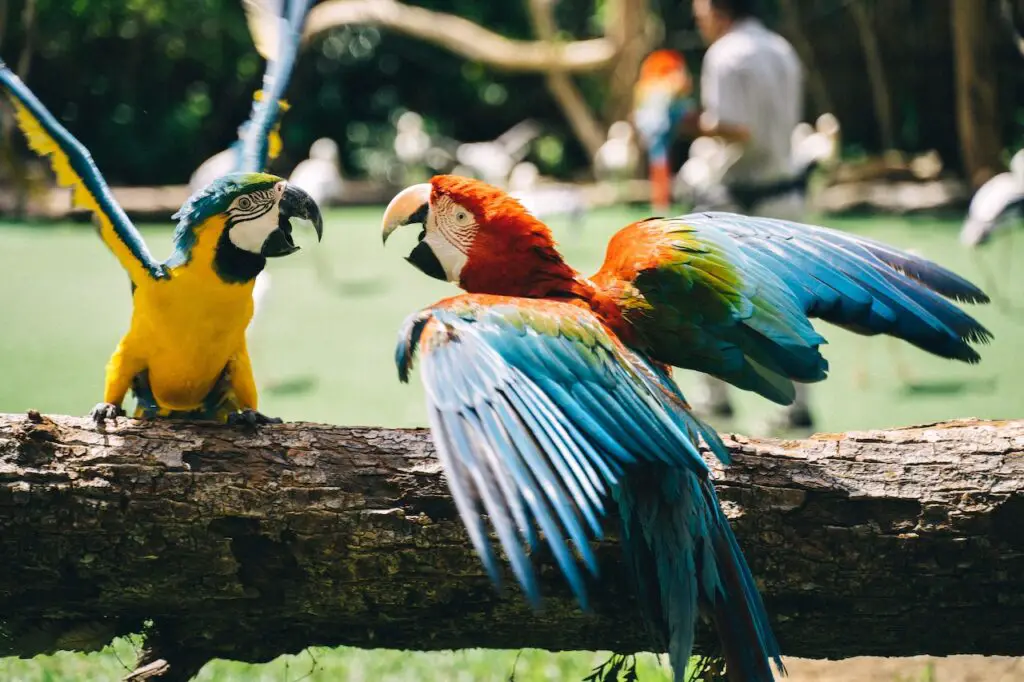
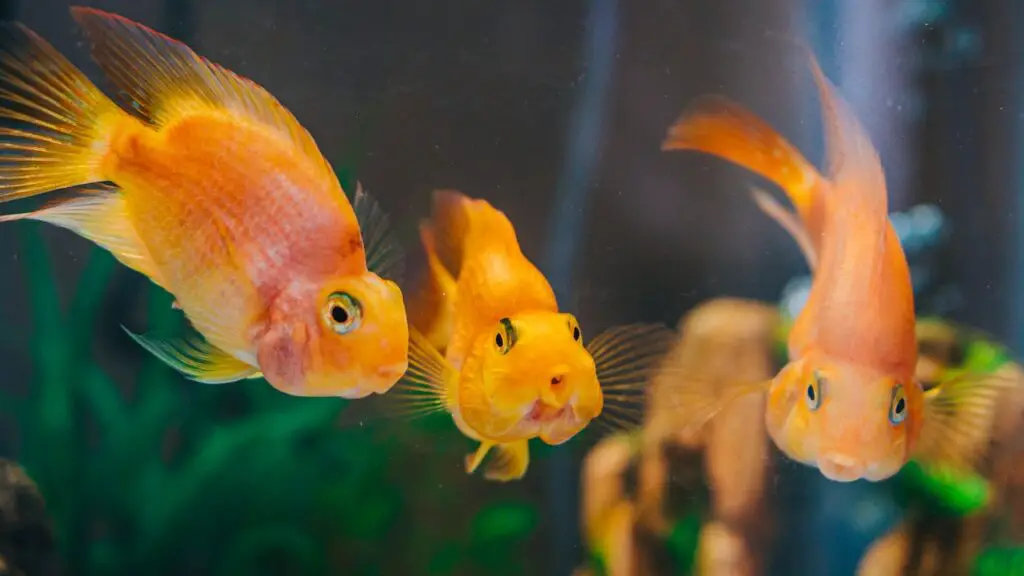
![Exotic Small Mammals Nutritional Guide [Your Ultimate Resource], two guinea pigs eating veggies](https://exoticpetsplace.com/wp-content/uploads/2023/06/Exotic-Small-Mammals-Nutritional-Guide-Your-Ultimate-Resource-two-guinea-pigs-eating-veggies-1024x706.jpg)
